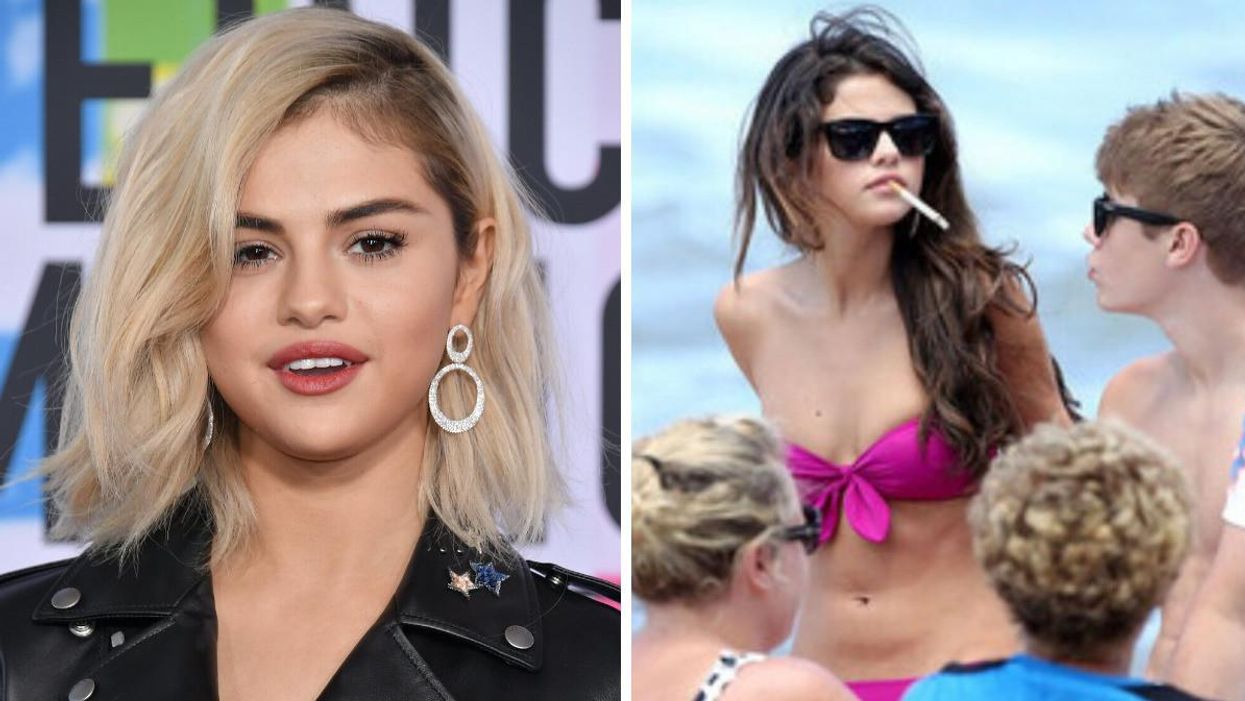Selena Gomez Is Making It Cool To Talk About Mental Health In These 4 Incredible Ways
Gomez has shown the world how it can be done right.

Selena Gomez smiling for the cameras. Right: Selena Gomez practicing self care at the beach.
The views expressed in this Opinion article are the author’s own and do not necessarily reflect the views of Narcity Media.
As a Gen Zer, my mental health has changed because of the COVID-19 pandemic, something many people across Canada, the United States and people the world over can relate to. There have been initiatives in some schools to increase the number of mental health professionals but some celebrities, like Selena Gomez, have taken matters into their own hands.
I grew up watching Selena Gomez on Disney Channel and have been a fan of her music ever since I was a kid. In the last few years, I’ve followed her struggles with mental health on social media. This online presence is inspiring to me and surely has been for the rest of her audience. She's very vocal about her experiences, explaining to Allure that she wants to “create a space for other [people so] they don’t go through what [she’s] gone through.”
I\u2019m\u202fexcited to share my NEW @RareBeauty Stay Vulnerable Collection with you! Available 1/7 at 9PM PT only at\u202f@sephora. #StayVulnerablepic.twitter.com/KLULdsRsfT— Selena Gomez (@Selena Gomez) 1609864457
Her beauty line “Rare Beauty” and app "Wondermind"
Enter Rare Beauty, Gomez’s makeup brand. She founded this company in 2020, but it’s arguably a more unique brand than legacy brands like Maybelline, KKW Beauty, and Lancôme. Rare Beauty donates 1% of all sales to Gomez’s nonprofit, which is designed to give people mental health resources and break down stigmas. In 2020, Rare Beauty donated $1.2 million to mental health foundations. Even more impressive, Gomez has committed to donating $100 million in the company’s first ten years.
Her app Wondermind was launched in December of 2021 that connects youth to education and mental health and will hopefully be an extra measure in ending the stigma around confronting mental health issues for not just Gen Z, but others too.
She uses social media as a tool for good
Gomez is also focused on her Gen Z fanbase who have grown up watching her on Disney Channel, just as I did. Gen Z is unlike previous generations because we are the first to grow up on the internet. We’ve had access to more information and spaces than previous generations ever did. Social media also encourages vulnerability unlike anything else. I have friends who regularly discuss their anxiety struggles on Twitter and others who use Instagram to promote discussion about their body image issues. Talking about mental health has become natural for people my age. This could be why more Gen Zers and Millennials reported average to poor mental health than Boomers and Gen X. However, Gen Z seems the most likely to share their mental health struggles than other generations.
I can\u2019t wait to learn how students across the country are approaching mental health and self-care. #GooglePartner #DoodleforGoogle #GoogleDoodlehttps://twitter.com/Google/status/1483525263195525123\u00a0\u2026— Selena Gomez (@Selena Gomez) 1642535944
She uses her celebrity the right way
It seems like Selena Gomez knows her audience, so she uses Gen Z’s openness as a vehicle for her philanthropy. Gomez is an example of what more celebrities could truly do with their platform. She uses her experiences to promote awareness of these commonplace issues. I don’t believe that every celebrity should speak on every important issue — in fact, I typically criticize those who do. But Gomez has shown the world how it can be done right. She’s created an outlet for young, struggling individuals. This achievement is incredibly inspiring to me, and I hope others are just as influenced by her aspirations.
Talking about mental health is scary but she makes it okay
Gomez has also shown that talking about mental health is okay. In fact, it should be normal. I have accepted this normalcy along with my fellow members of Gen Z. Other generations have yet to catch up. Perhaps there could be a future symbol for these generations to cling onto, just as Gen Z has done with Selena Gomez. Older public figures could take a similar step forward by talking about their own mental health struggles. This could show Elder Millennials, Gen X’ers, and Boomers that anxiety, depression, and other issues are not things to be afraid of. Rather, we should embrace our flaws without fear.
I know how scary mental health can be to talk about. Even though I’m a part of Gen Z, I was still afraid to think about some of the struggles I endured because of the pandemic. But the people around me were open about their troubles, which made me more comfortable with discussing. That’s why it’s important to have figures in our lives who are willing to help us through challenging situations.
Not everyone is as fortunate to have support from friends or family, but if public figures start taking a stand in bolstering mental health, we could take another step in the right direction.